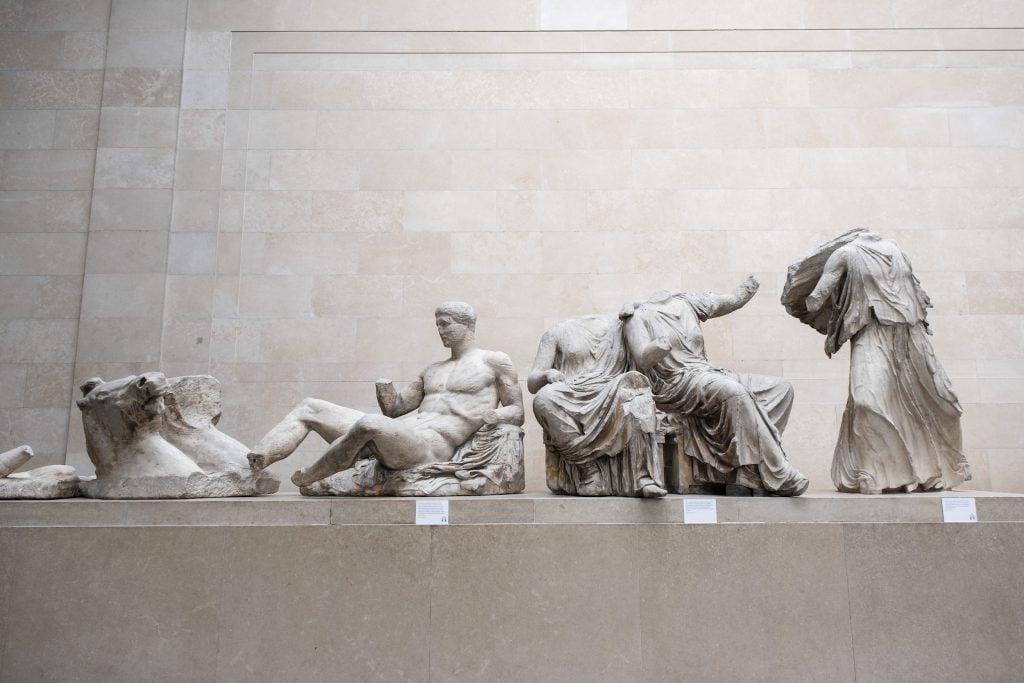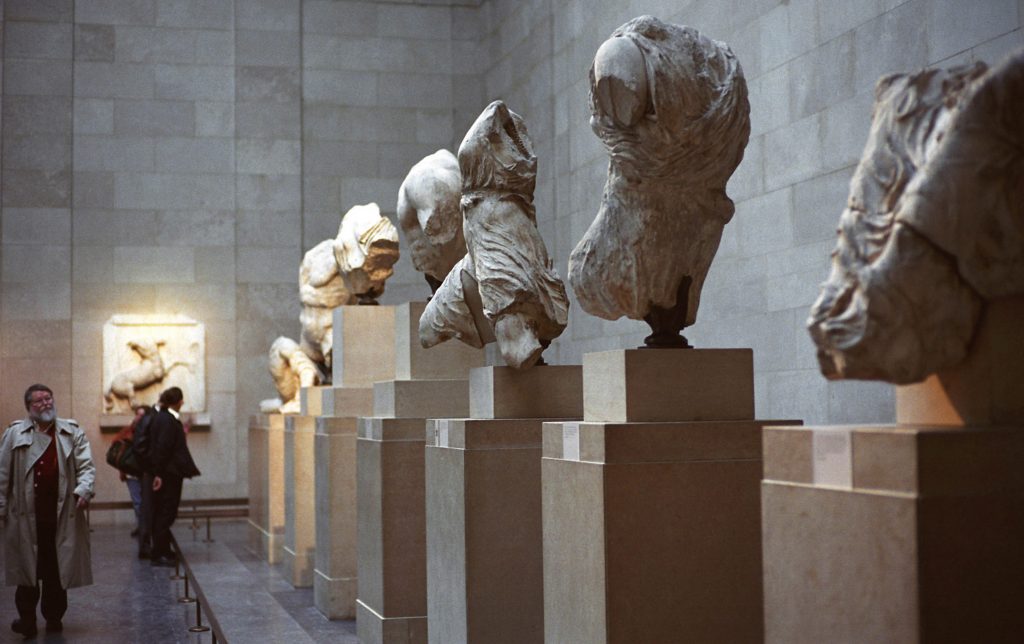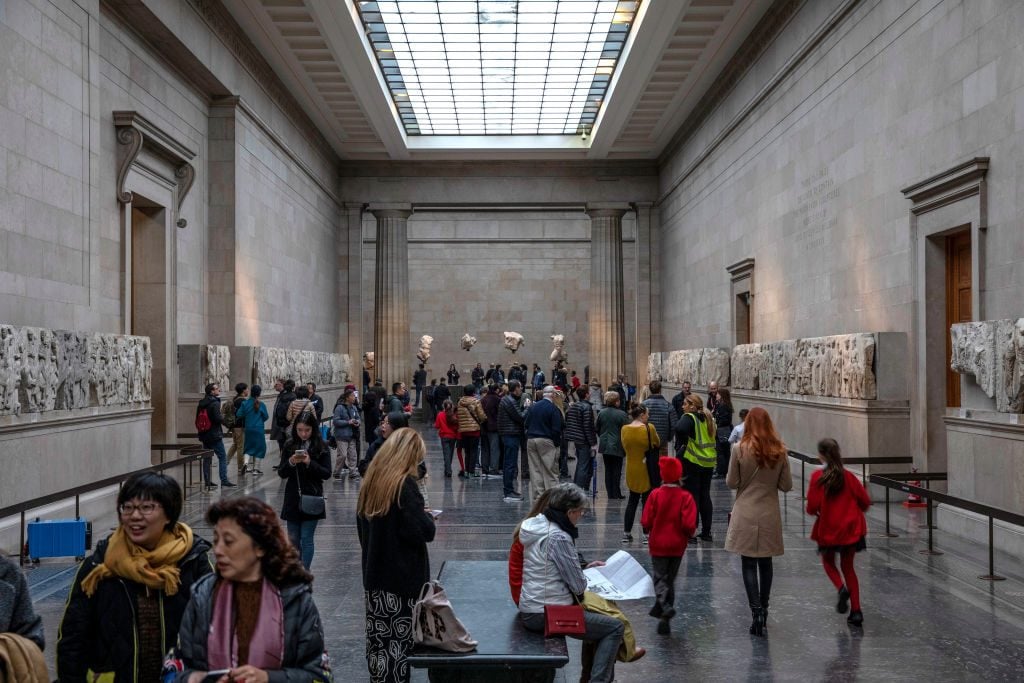Museums & Institutions
New British Museum Director Proposes ‘Lending Library’ to Address Parthenon Marbles Return
Nicholas Cullinan became director of the British Museum in March.

Nicholas Cullinan became director of the British Museum in March.

Sarah Cascone

When Nicholas Cullinan became head of London’s British Museum in March, he inherited the thorny problem of what to do with the Parthenon Marbles. Now, it appears he may have hit on a solution: a Parthenon Marbles “lending library” that would allow the works to go back to Greece without leaving the British Museum collection.
“I would hope a partnership of some form is possible,” he told the BBC in an interview, as reported by the Independent. “I think it’s a bit too soon for me to get into the particulars around how that could work, but I’m hopeful.”
The Mediterranean nation has long demanded the return of the famed antiquities, accusing Thomas Bruce, the seventh Earl of Elgin, of looting them from the Acropolis in Athens. British Parliament purchased the ancient sculptures from Lord Elgin in 1816.
The Parthenon Marbles’ restitution is currently prohibited under the 1963 British Museum Act, which outlaws public institutions from deaccessioning collection objects.

Sculptures which form part of the “Elgin Marbles,” taken from the Parthenon in Athens, Greece almost two hundred years ago by the British aristocrat, the Earl of Elgin, are on display January 21, 2002 at the British Museum in London, England. Photo by Graham Barclay, BWP Media/Getty Images.
Cullinan acknowledged the roadblock presented by the act. “The challenge for us, again, is not to deny that or suppress that, but to be open—but then to think, ‘How can we do something positive with this legacy?’” he said.
The debate surrounding the fate of the Parthenon Marbles has been raging since Greece first formally requested their return in 1983. For a brief period, Greece even had a celebrity lawyer on the case in Amal Alamuddin-Clooney.
Cullinan’s predecessor, Hartwig Fischer, had been outspoken in defense of the British Museum’s ownership of the marbles, calling their removal from the Parthenon “a creative act” in 2019.
And as recently as 2021, the U.K. insisted that Lord Elgin acquired the marbles legally, rejecting UNESCO’s call that the nation reconsider the issue of their restitution.
But talks between the two countries resumed in 2022. By year’s end, there were rumors that some kind of deal was in the works. And in 2023, talks between the museum and Greece were said to be “constructive.” But a potential agreement fell apart because describing the return of the marbles as a “loan” was a dealbreaker for Greece.

Sections of the Parthenon Marbles at The British Museum. Photo by Dan Kitwood/Getty Images.
In November, the still-ongoing dispute scuttled a planned meeting between Greek prime minister Kyriakos Mitsotakis and his British counterpart at the time, Rishi Sunak. Mitsotakis had said that the marbles were “essentially stolen,” and that refusing to reunite the entirety of the sculptures was like cutting the Mona Lisa in half.
Sunak had previously insisted there were “no plans” to change the 1963 law to allow for restitution.
Most recently, Greece made another stab at negotiations in January, offering regular loans of important Hellenic antiquities in exchange for the marbles’ return.
If the British Museum were ever to agree to restitution, it would be following in the footsteps of the Pope. In December 2022, the Vatican Museums announced the returned a trio of Parthenon Marbles to Greece. The works had been at the Holy See for two centuries.
In the past, the British Museum has argued that is it best equipped to safeguard the marbles for future generations. But the museum’s Greek, Assyrian, and Egyptian galleries have been plagued with leaks and poor ventilation, requiring the use of fans, space heaters, and plastic tarps. And news last year of a 1,500-object theft at the institution added further fuel to the fire,
Greece, meanwhile, has built a state-of-the-art Parthenon Gallery designed for the display of the works in Athens. The room in the Acropolis Museum also allows viewers to look out the window at the marbles’ original site, high on the top of the Acropolis.